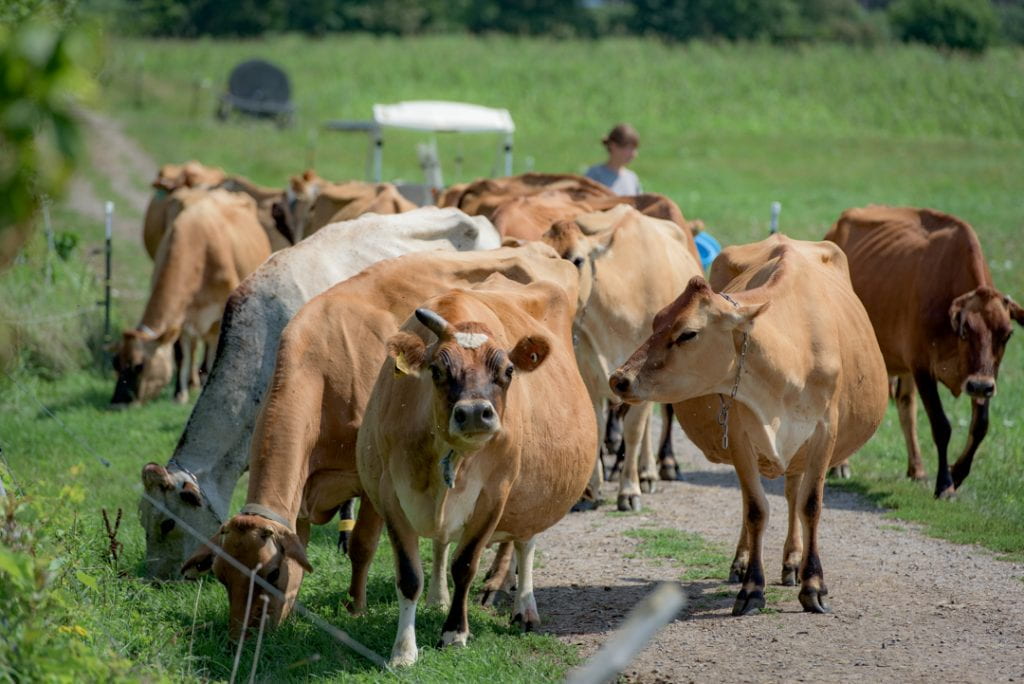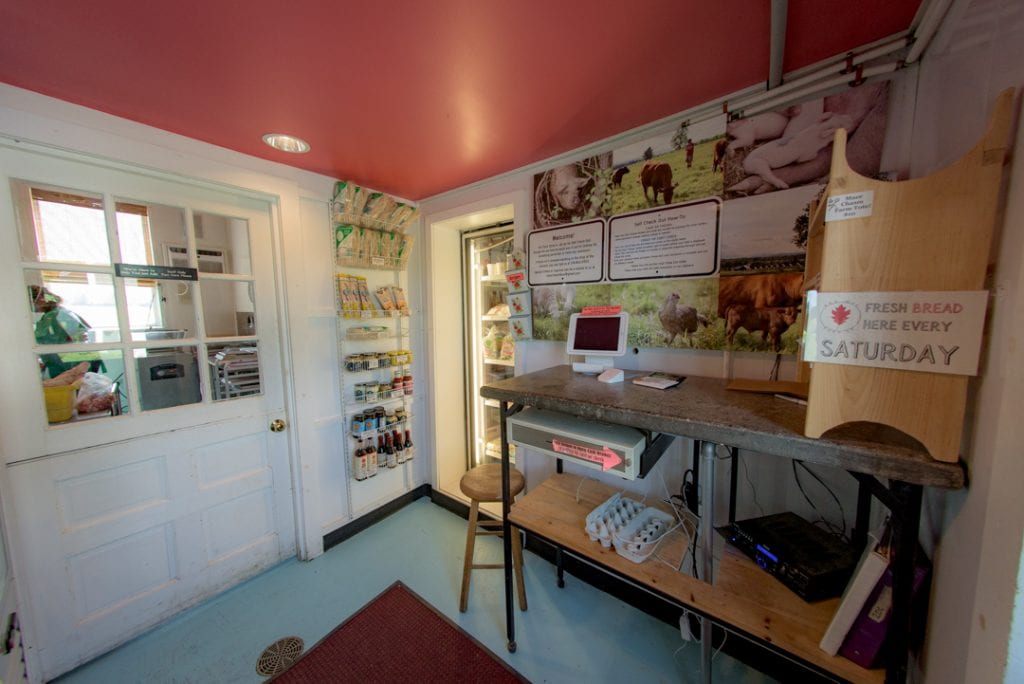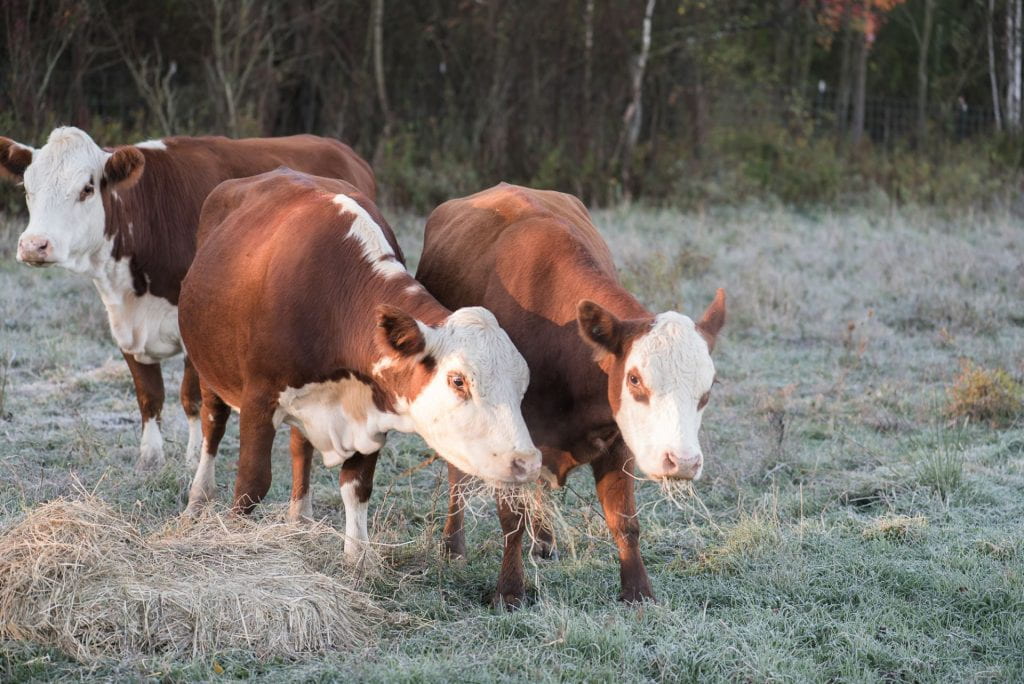Roisin Creedon-Carey chose to intern at Cornell Cooperative Extension to focus on sustainable agriculture practiced through community living. This is the second installment of three blog posts in her experience embracing seasonal and local eating. Find the link to her recipe at the close of the article.
In the Yurt village at the Adirondack Semester, all our veggies and meat were local. We diced carrots from North Country soils, sauteed perfectly purple eggplant, and fried ground beef for stroganoff. The students were divided into 5 cook teams to make all our meals. As the semester progressed, we ended up filling specific food niches. My cook partner and I made eggplant parmesan, stir-fries, and the Wednesday night classic of the semester was the recipe I am featuring today: Beef Stroganoff. With a few gluten-sensitive residents, two vegans, and two vegetarians this recipe lent itself to interpretation. Ultimately, we ended up with three pots of pasta: one with meat and dairy, one with meat substitutes, and one without meat, dairy, or gluten
Halfway through our fall semester, we toured three Adirondack farms and were excited to learn about sustainable agriculture from young minds. Getting our food from local farmers was fulfilling so we were eager to meet the people with dirt under their fingernails. After a Friday of woodworking and lectures, we packed our bags for an overnight at North Country Creamery in Keeseville, New York. We pitched our tents and bedded down early so we could rise with the sun to milk the cows. The philosophy at North Country Creamery is perfectly exemplified by their farm store. Left unlocked and operated on the honor system, owners Ashlee Klainhammer and Steve Googin want to provide for their immediate community before all else. Inspired by our morning milking, Bri Duggan, beef stroganoff creator, sustainable agriculture fan, and avid student decided to intern at North Country Creamery. Duggan likes this recipe because it’s a good dish for a large group and it’s easy to customize since as she says, “you can add as many veggies as you want!”

With just enough coffee in our systems to make it to the next stop, we drove up the road to Mace Chasm Farm. As our Adirondack Semester program centers around community living, we eagerly hung onto every word Asa Thomas-Train told us about the lively nights when their farm hosts summer music events. They aren’t just partying all the time, in fact they work hard raising their own livestock, with an on-site butcher shop where they create custom sausage flavors, bone broths and more. Mace Chasm aims to be resilient and ensure that the needs of both the farm and the customers are met. We were getting accustomed to this level of care for the community and livestock. Particularly impressed, fellow Adirondack Semester student Cara Monteleone is currently learning how to butcher meat here and they say “the time and effort put into caring for the livestock shows in the product. It’s rewarding to give back to a strong community that benefits from having a resource like Mace Chasm.”

Our last stop of the day was Essex Farm, a full-diet CSA that has operated for over a decade. Co-owner Mark Kimball ran around with us as we picked raspberries with gleeful eyes and full bellies. He closed out the tour by generously offering us armloads of vegetables, dairy, and freshly ground beef. Mark’s philosophy on community stems from reciprocity and gratitude. And what did we do with this living abundance? We turned it into beef stroganoff, of course!

In a semester focused on place, sustainability, and reciprocity there was no better way to align our values than to source our food from area farmers. At this point in the semester we’ve been asked how this experience will impact our lives going forward. For some, this takes the shape of farming, others working for environmental non-profits, and some will get involved in local politics. While we’ve all been impacted differently, the sense of fulfillment we gained from home cooked meals and authentic farmers will remain a testimony to the value of passion and thoughtfulness in rooting ourselves to a place.
Here’s how we made our Beef Stroganoff on the Adirondack Semester, find recipe here.